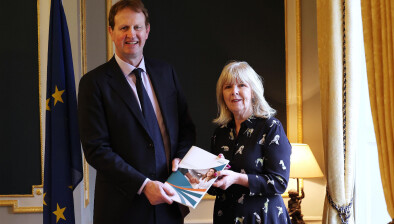Killian Flood: Who actually stands to benefit from barrister/solicitor partnerships?

With the recent change in law allowing barristers and solicitors to enter into partnership, Killian Flood offers his views on how the new business model might work in practice, and who stands to benefit from barrister/solicitor partnerships.
As of 8 October, barristers can enter into legal partnerships with both other barristers and solicitors, thus altering the “sole trader” model that had pertained since the inception of the State (and quite a bit before that). Before now, barristers operated as part of an independent referral bar, where they were separate from solicitors and their clients. It’s the sort of genuinely radical overhaul of the legal services industry that will be generally popular, given the long-standing reputation of Irish barristers as being affluent beyond reason at the expense of clients.
Heralding the change in law, the minster for justice, Helen McEntee, outlined her view that the new partnership laws diversified the Irish legal services sector, and that partnership “offers the potential for a more flexible and cost-efficient service”.
Similarly, the LSRA chief executive Dr Brian Doherty described his view that barristers and solicitors practising in partnership “will benefit from the efficiencies that flow from a group practice, such as being able to share backroom costs and client work, as well as risks”.
Buzzword
It would appear that “efficiency” is the buzzword chosen to justify the upheaval in the legal sector, but little detail has been provided on the exact efficiencies that will be gained under the new business model. The powers-that-be seem satisfied that simply providing a new scheme for lawyers to charge fees will result in significant improvements to the legal sector as a whole.
The change in partnership law is certainly interesting, and I am sure there will be some lawyers who will jump at the opportunities presented to them. However, I am struggling to find a true organisational incentive for lawyers on both sides of the aisle to adopt the barrister/solicitor partnership model. I am also not convinced that the purported efficiencies of the new model will yield positive results for clients.
For a start, members of the Bar already benefit from the “efficiencies that flow from a group practice”. As a practitioner in my seventh year, I pay €5,235 to the Law Library, for which I get physical and online library access, building maintenance, a DX service, 24/7 security, IT support, CPD presentations, a fee recovery service and all other utilities. My office adds additional cost, but that is a choice I have made. Desks can be provided to members for only a few hundred euro more.
In all, members of the Bar have low overhead costs when running their practices, so in truth this is not a factor that will have an impact on the adoption of the new model by barristers. If anything, the Bar’s low overhead costs mean that clients pay less than they would for a barrister in partnership with a solicitor.
From a solicitor’s perspective, the traditional split in the legal professions had the practical effect of allowing solicitors and clients a free choice of counsel in all cases.
There was (and remains) no obligation to use the services of a particular barrister in a particular case. Moreover, the legal advice and advocacy services offered by barristers allowed solicitors to essentially outsource litigation specialism, meaning that less of their time was spent working substantively on cases. In getting barristers to draft paperwork, provide opinions or run a hearing, solicitors had more time to engage with clients and develop their own firm’s business.
A free choice of counsel also means that clients can tailor their legal representation based on the requirements of their case. If they need specialist advice in, for example, a probate matter, they can access the best probate barristers through the independent Bar. Critically, if one specialist barrister is unavailable, any other available probate barrister may be instructed.
While working directly with an in-house barrister would still allow solicitors to delegate work and develop their business, it comes at the cost of a free choice of counsel. While I can not speak for others, as a barrister I would expect first refusal on all cases that came through my solicitor-partners’ door.
I do wonder whether the politics of briefing, and particularly the fact that solicitors are currently not answerable to barristers in handing out briefs, would disincentivise solicitors’ firms to take the plunge. It surely is in the best interests of solicitors and clients to have the option to brief any barrister in a case as needed, rather than be obliged to brief a small number of barrister partners.
Financial incentives
However, in my view, the most important factor to the adoption of the new legal partnership framework will be the financial incentives on offer for lawyers. If solicitors can make more money in partnership with barristers, then they will rush to accept the new world order. We know that solicitor partnerships have allowed some firms to make substantial profits, so it would seem natural that the addition of barristers would also enhance their earnings.
However, I do not believe that this is a given. For one thing, if firms are going to be tethered to barristers as partners, then they will want to attract the best talent the Bar can offer. And yet, frankly, the top barristers in a given field are making shedloads of cash. In order for solicitors to provide an incentive to would-be barrister partners, they will need to offer a package that improves or equals that barrister’s current earnings. That will be costly, perhaps prohibitively so.
A large firm would probably need to take on several senior barristers to cover their litigation departments. Paying those barristers to be partners, whether on a salaried or equity basis, would add millions to the payroll. A cost/benefit analysis may not favour adding those barristers, particularly when counsel do not have a role in client acquisition and retention. The extra fee generation required to sustain the addition of barrister partners may not be worth the “efficiency” of having dedicated in-house counsel.
Equally, a barrister joining a solicitor partnership will be cutting themselves off from any other source of work. As such, a senior barrister in the prime of their career is unlikely to be interested in jumping ships unless they have iron-clad security as to their income and workflow.
Moreover, barristers would likely lose the ability to run their practices as they saw fit. Instead, one assumes that they would be subject to working billable hours at the same rate as other partners. Even for a busy barrister used to working long hours, this will not be an attractive prospect. One of the great benefits of the Bar is being able to choose how and when to work. Giving up this benefit to work in a partnership requires more than just flimsy platitudes of efficiency and flexibility.
In all, there do not seem to be obvious incentives for solicitors and barristers to go into partnership in the short term. When examined closely, I believe that the “efficiencies of group practice” are more apparent than real, and there are few barristers who will relish the opportunity to become in-house counsel for solicitors firms.
Barrister/solicitor partnerships will not be widely adopted unless there’s a net benefit for both professions in the business. Otherwise, there is simply no incentive for one profession to join the other. Given that recent LSRA research has shown only 20 per cent of solicitors firms believe they will have barrister partners within the next five years, it is clear that lawyers are approaching the new business model with a touch of scepticism.
Cost efficiencies
However, even if I am completely wrong and it turns out that partnerships offer a sunshine-and-rainbows opportunity for the professions, there remains the thorny issue of how clients will benefit from the new scheme. The supposed efficiencies and flexibilities of the new partnership model are not going to be a public good unless there is a tangible benefit to clients, particularly in respect of costs.
And there’s the rub. It is offensively naïve to think that creating a “one-stop shop” for legal services will reduce the cost to clients.
If a specialist barrister has to act in your case, it’s going to add costs. Full stop, end of story. Whether that barrister is charging as a sole practitioner or as part of a firm, it will cost clients more money to engage them than a solicitor alone. If you need two lawyers to work on your case, you will be paying for the time of two lawyers.
This is not an episode of Suits. There is no Harvey Specter in any law firm that can do everything in a court case from start to finish.
It is therefore misleading to suggest to the public that there will be significant cost efficiencies under the new model. Firms will have to generate additional fees to pay for these new barristers (who do not do the same work as solicitors) so why anyone would think that fees would go down is beyond me.
Similarly, as a matter of professional practice, barristers will still need to be attended in court by their instructing solicitor. So, there are no efficiency gains in terms of court appearances and, if anything, barristers would be obliged by their firm to charge for every minute they spent in a court list rather than a flat fee.
If we assume that I am correct, and the new partnership model will only be adopted where there are financial incentives for both professions, then this must mean that the client will be paying as much or more for legal services.
Similarly, one of the great advantages of instructing an independent barrister is that they are not worried about client retention. Legal advice, whether positive or negative, is given to the client without fear that it will affect a firm’s bottom line. For a barrister acting in partnership with a solicitor, there is a risk that the pressures of client retention would affect legal advice, to the detriment of the client.
Of course, this is all prognostication and reasonable minds will differ on this topic. But my educated guess is that, as it stands, nobody stands to benefit from barrister/solicitor partnerships.









